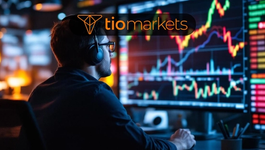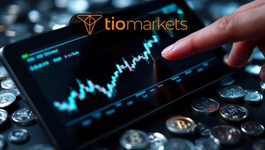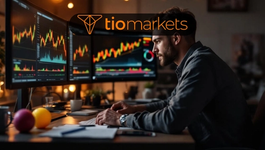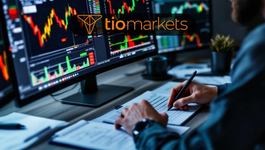A Guide to Trading Futures
BY TIOmarkets
|May 20, 2024Trading futures can be an exciting and lucrative endeavor. It allows traders to speculate on the price movements of various assets, including commodities, currencies, and stock market indices. In this guide, we will explore the basics of futures trading, the mechanics involved, strategies to consider, and common mistakes to avoid.
Understanding the Basics of Futures Trading
Before diving into the world of futures trading, it's essential to understand what futures are and their importance in the trading market. Futures are financial contracts that obligate the buyers and sellers to transact a specified asset at a predetermined price and date in the future.
The primary purpose of futures is to provide a standardized platform for hedging and speculation. These contracts facilitate price discovery and play a crucial role in maintaining market liquidity.
To navigate the futures market, it's crucial to familiarize yourself with key terms commonly used in futures trading. This includes concepts like contract size, tick size, margin requirements, and expiry dates. Understanding these terms will help you make informed trading decisions.
One of the key advantages of trading futures is the ability to leverage your capital. By trading on margin, investors can control a large contract value with a relatively small amount of capital. However, it's important to note that while leverage can amplify profits, it can also magnify losses, making risk management a critical aspect of futures trading.
Another important factor to consider in futures trading is market analysis. Traders often use technical analysis, fundamental analysis, or a combination of both to make trading decisions. Technical analysis involves studying past market data, such as price and volume, to predict future price movements. On the other hand, fundamental analysis focuses on economic factors, supply and demand dynamics, and geopolitical events that can impact the price of the underlying asset.
The Mechanics of Futures Trading
Now that we have a foundation in futures trading, let's explore how futures contracts work and the role of the futures exchange. Futures contracts are traded on organized exchanges, where buyers and sellers come together to transact. These exchanges act as intermediaries, ensuring fair and orderly trading.
When trading futures, it's important to understand the concept of margin and leverage. Margin represents the initial deposit required to enter a futures position, while leverage allows traders to control a larger position with a smaller amount of capital. While leverage can amplify profits, it also increases the risk of losses.
One key aspect of futures trading is the concept of hedging. Hedging involves using futures contracts to offset potential losses in another investment. For example, a farmer might use corn futures to hedge against a drop in corn prices at harvest time. This strategy helps reduce the impact of price fluctuations on the farmer's bottom line.
Another important factor to consider in futures trading is the role of speculators. Speculators are individuals or entities who trade futures contracts with the goal of profiting from price movements. While speculators can add liquidity to the market and help facilitate price discovery, their activities can also introduce volatility and risk.
Strategies for Trading Futures
When it comes to trading futures, there are various strategies to consider. Two popular approaches are fundamental analysis and technical analysis.
Fundamental analysis involves evaluating factors such as economic indicators, supply and demand dynamics, and geopolitical events to anticipate price movements. Traders who employ this strategy seek to identify undervalued assets or opportunities that align with prevailing market trends.
On the other hand, technical analysis focuses on analyzing historical price and volume data to identify patterns and trends. Traders who utilize technical analysis use tools like chart patterns, indicators, and candlestick formations to make trading decisions.
Risk management is also a critical aspect of futures trading. Traders should establish proper position sizing, set stop-loss orders to limit potential losses, and diversify their portfolio to manage risk effectively. Sound risk management practices can help preserve capital and protect against unforeseen market movements.
Moreover, it's essential for futures traders to stay informed about global economic developments, as these factors can significantly impact commodity prices and market sentiment. Keeping abreast of news related to trade agreements, central bank policies, and geopolitical tensions can provide valuable insights for making informed trading decisions.
Additionally, understanding the concept of leverage is crucial for futures traders. Leverage allows traders to control a large position with a relatively small amount of capital, amplifying both potential profits and losses. It's important for traders to use leverage judiciously and be aware of the risks involved, as excessive leverage can lead to significant financial losses.
Common Mistakes in Futures Trading
It's important to be aware of common pitfalls in futures trading to avoid unnecessary losses. Overtrading is a prevalent mistake among beginners, leading to poor decision-making and excessive transaction costs. It's crucial to exercise patience and discipline when identifying trading opportunities.
Neglecting the importance of stop-loss orders is another common mistake. A stop-loss order automatically closes a position when the price reaches a predetermined level. This strategy can help limit potential losses and protect profits but ignoring it can expose traders to significant risks.
Misunderstanding leverage and its risks can also lead to costly mistakes. While leverage enables traders to control larger positions, it amplifies both profits and losses. It's crucial to use leverage judiciously and consider the potential downside before entering trades.
Furthermore, failing to conduct thorough research and analysis before making trading decisions is a critical error. In the fast-paced world of futures trading, staying informed about market trends, economic indicators, and geopolitical events is essential. Without a solid understanding of the factors influencing price movements, traders may make uninformed choices that result in financial losses.
Moreover, emotional trading based on fear or greed can cloud judgment and lead to impulsive decisions. It's important for traders to maintain a rational mindset and stick to their trading plans, avoiding knee-jerk reactions to market fluctuations. Developing a disciplined approach to trading can help mitigate emotional biases and improve overall performance.
In conclusion, trading futures can be an exciting and profitable venture if approached with the right knowledge and strategies. By understanding the basics, mechanics, and employing risk management techniques, traders can navigate this dynamic market with greater confidence. Remember, continuous learning and discipline are key to success in the world of futures trading.
Start Your Futures Trading Journey with TIOmarkets
Ready to take the leap into the world of futures trading? Join TIOmarkets, a top rated forex broker with over 170,000 accounts opened across more than 170 countries. Our online trading platform offers you the opportunity to trade Forex, indices, stocks, commodities, and futures markets with low fees. With access to over 300 instruments in 5 markets, you'll have all the tools you need to succeed. Enhance your trading skills with our comprehensive suite of educational resources and step-by-step guides.
Create a Trading Account today and embark on a path to trading futures effectively!

Risk disclaimer: CFDs are complex instruments and come with a high risk of losing money rapidly due to leverage. You should consider whether you understand how CFDs work and whether you can afford to take the high risk of losing your money. Never deposit more than you are prepared to lose. Professional client’s losses can exceed their deposit. Please see our risk warning policy and seek independent professional advice if you do not fully understand. This information is not directed or intended for distribution to or use by residents of certain countries/jurisdictions including, but not limited to, USA & OFAC. The Company holds the right to alter the aforementioned list of countries at its own discretion.
Join us on social media

Behind every blog post lies the combined experience of the people working at TIOmarkets. We are a team of dedicated industry professionals and financial markets enthusiasts committed to providing you with trading education and financial markets commentary. Our goal is to help empower you with the knowledge you need to trade in the markets effectively.





